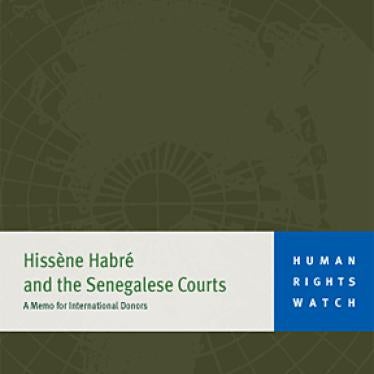(Dakar) – The Senegalese government should stop delaying the extradition of former Chadian dictator Hissène Habré to Belgium, a coalition of human rights organizations said today.
On January 10, the Court of Appeals of Dakar again declared a Belgian extradition request inadmissible because legalpapers the court received from the Senegalese government were not in order. It was the second such decision in six months.
“It’s time for the Senegalese government to stop playing games and to send Hissène Habré to Belgium to face trial,” said Jacqueline Moudeïna, lawyer for Habré’s victims and coordinator of the International Committee for the Fair Trial of Hissène Habré. “Habré’s victims have been fighting for justice for 21 years and all they have gotten from Senegal is the run-around.”
Habré is accused of thousands of political killings and systematic torture when he ruled Chad from 1982 to 1990, before fleeing to Senegal.
The government of Senegal has repeatedly refused, then agreed under pressure, and finallyrefused again to prosecute him. His victims are now seeking his extradition to Belgium,which made its first request in 2005.
The International Committee for the Fair Trial of Hissène Habré – which comprises the Chadian Association for the Promotion and Defense of Human Rights (ATPDH), the Association of Victims of Crimes of the Regime of Hissène Habré (AVCRHH), the African Assembly for the Defense of Human Rights (RADDHO), Human Rights Watch, and the International Federation of Human Rights (FIDH), among others – said that they hoped and expected that Belgium would quickly file a new extradition request.
The committee noted that the United States Congress had in December expressed its “concer[n] that Hissene Habre has not been extradited for prosecution” and requested US Secretary of State Hillary Clinton to report to Congress by February 6 on “steps taken by the Government of Senegal to assist in bringing Habre to justice.” The Congressional statement came as the Congress approved US$50 million in development assistance for Senegal.
“I was jailed by Hissène Habré for four years and Senegal has prolonged my suffering for more than two decades,” said Clément Abaifouta, president of the AVCRHH, who, as a prisoner under Habré, was forced to dig graves for more than 500 fellow inmates. “But I still have faith that Hissène Habré will be tried one day and that, in the courtroom, he will have to explain why I was arrested and tortured.”
Habré was first indicted in Senegal in 2000, but after political interference by the Senegalese government that was denounced by two UN human rights rapporteurs, the country’s courts said that he could not be tried there. His victims then filed a case in Belgium. After years of investigation, in September 2005, a Belgian judge requested his extradition. Senegal asked the African Union (AU) to recommend a course of action, and in July 2006, the AU called on Senegal to prosecute Habré “on behalf of Africa.”
Years of stalling ensued, even after international donors fully funded the US$11.9 million trial budget in November 2010.In May 2011, Senegal walked out of talks with the AU over the trial and made clear that it would not prosecute Habré. On July 10, President Abdoulaye Wade of Senegal reversed a decision announced two days earlier to expel Habré to Chad, where he has been sentenced to death in absentia.
Belgium made a second extradition request on March 15, 2011. OnAugust 18, the Dakar Appeals court declared the request inadmissible on the ground that the extradition request was not accompanied by the underlying papers, such as the Belgian arrest warrant, andhad not been properly filed. However in that ruling, the court referred only to a follow-up diplomatic note sent by Belgium, and not the March 15 request, which was apparently never transmitted to the court by the Senegalese government.
On September 5, Belgium filed a third request. On January 10, 2012, the Court of Appeals again declared the request inadmissible on procedural grounds,stating that the 2005 arrest warrant attached to the extradition request was not an authentic copy. Belgian officials have assured the Committee that the warrant handed to the Senegalese ministry of foreign affairs on September 5 was correctly certified by the Brussels district court,the Ministry of Justice, and the minister of Foreign Affairs. It was not immediately clear whether the Court of Appeals had in front of it the same papers handed to the ministry on September 5.
The government of Chad announced in July 2011 that it was in favor of extraditing Habré to Belgium. Although Rwanda recently announced that it was also willing to try Habré in its courts, the Committeesaid it believed this option would lead to many more years of delay before the trial could be held, as survivors and potential witnesses die each month
Files of Habré's political police (Direction de la Documentation et de la Sécurité, DDS), which were discovered by Human Rights Watch in 2001, revealed the names of 12,321 victims of human rights violations, including 1,208 who were killed or died in detention.






